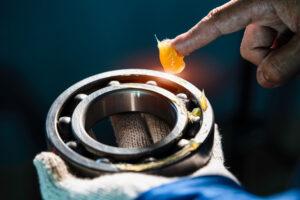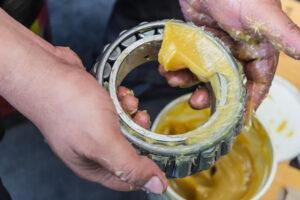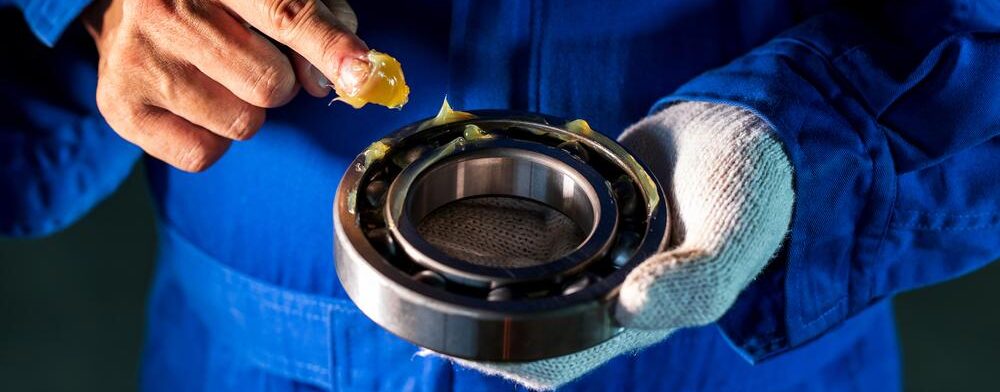Ball bearings are a crucial part of many machines and mechanical systems, from small appliances to large industrial machines. They allow for smooth and efficient movement by reducing friction between moving parts and enabling smooth operation. However, bearings can become damaged—or even fail prematurely—without proper ball bearing lubrication, leading to costly repairs and downtime.
To ensure the longevity and optimal performance of ball bearings, it is important to use the right type of lubricant.
Why Is Ball Bearing Lubrication Important?
First, it’s important to understand how ball bearings work to understand why lubrication matters. A ball bearing consists of an inner and outer ring with a series of balls arranged between them. The balls rotate inside the rings, allowing the two rings to move independently of each other. The balls themselves are held in place by a cage or retainer, which prevents them from rubbing against each other.
The primary purpose of lubrication is to reduce friction between the rolling elements of the bearing. Without proper lubrication, these components can rub against each other, leading to increased heat, wear, and tear.
Proper lubrication also helps prevent contamination from dust, dirt, and other particles that can enter the bearing and cause damage. Lubricants can act as a barrier, preventing contaminants from entering the bearing and reducing the likelihood of corrosion and other forms of damage.


Benefits of Ball Bearing Lubrication
One of the most significant benefits of proper ball bearing lubrication is reducing friction. Without lubrication, the bearing surfaces can generate significant amounts of heat due to the friction created between them. This can cause the metal components to expand, leading to increased wear and early failure. By providing a lubricant film between the surfaces, the friction is significantly reduced, and the heat generated is dissipated, leading to a longer bearing life.
Another critical benefit of proper ball bearing lubrication is its ability to protect against corrosion. Over time, environmental factors such as humidity and moisture can cause rust and corrosion to develop on bearing surfaces, leading to premature wear and failure. A lubricant helps to protect the bearing surfaces from these environmental factors, preventing corrosion and extending the bearing’s lifespan.
Additionally, proper lubrication helps to reduce noise and vibration. When a bearing is not adequately lubricated, it can create a buzzing or humming sound due to the increased friction between the surfaces. This noise can not only be annoying, but it can also be a sign of potential bearing failure. Proper lubrication helps to reduce noise and vibration, ensuring a smooth and quiet operation.
What Is the Best Lubricant for Ball Bearings?
When choosing a lubricant for ball bearings, it is important to consider the specific application and the conditions that the ball bearings will be subjected to. Factors such as temperature, speed, and load can all impact the performance of the lubricant. In addition, it is important to follow the manufacturer’s recommendations for lubrication intervals and quantities to ensure optimal performance and longevity of the ball bearings.
1. Mineral Oil Lubricants
Mineral oil lubricants are the most common type of lubricant used for ball bearings. These lubricants are made from refined crude oil and are affordable, widely available, and effective in reducing friction. Mineral oil lubricants can be used in a wide range of temperatures and are compatible with most ball bearing materials. They also have excellent rust protection properties, which can help to prevent corrosion in ball bearings.
2. Synthetic Oil Lubricants
Synthetic oil lubricants are made from synthesized chemicals and are designed to offer superior performance compared to mineral oil lubricants. Synthetic oils have a higher viscosity index, which means they maintain their viscosity at a wider range of temperatures. This makes them ideal for use in applications where temperatures can vary significantly. Synthetic oils also offer better resistance to oxidation, which can help to extend the life of the lubricant.


3. Grease Lubricants
Grease lubricants are a mixture of oil and a thickening agent, such as lithium, calcium, or aluminum. The thickening agent helps to keep the oil in place and provides a barrier to prevent contaminants from entering the ball bearings. Grease lubricants are ideal for applications where ball bearings are difficult to access and are often used in sealed or shielded ball bearings. They also offer good rust protection properties and can be used in a number of temperature ranges.
4. Dry Lubricants
Dry lubricants, such as molybdenum disulfide or graphite, are used in applications where oil or grease lubricants cannot be used. Dry lubricants are applied as a powder or paste and provide a low-friction barrier between moving parts. They are ideal for high-temperature applications or where contact with water or chemicals may occur. Dry lubricants are often used in aerospace, automotive, and industrial applications.
While the best type of lubricant to use for ball bearings depends on the specific application and conditions, it’s important to remember that any type will begin to lose its lubricating properties over time. For this reason, it’s important to inspect and maintain lubricant regularly to avoid bearing failure.
By reducing friction, preventing corrosion, and reducing noise and vibration, proper lubrication can significantly extend the lifespan of the bearings, ultimately saving time and money for businesses and individuals alike.
Contact IBT today to learn more, or visit ShopIBT.com to shop our selection of ball bearings.





